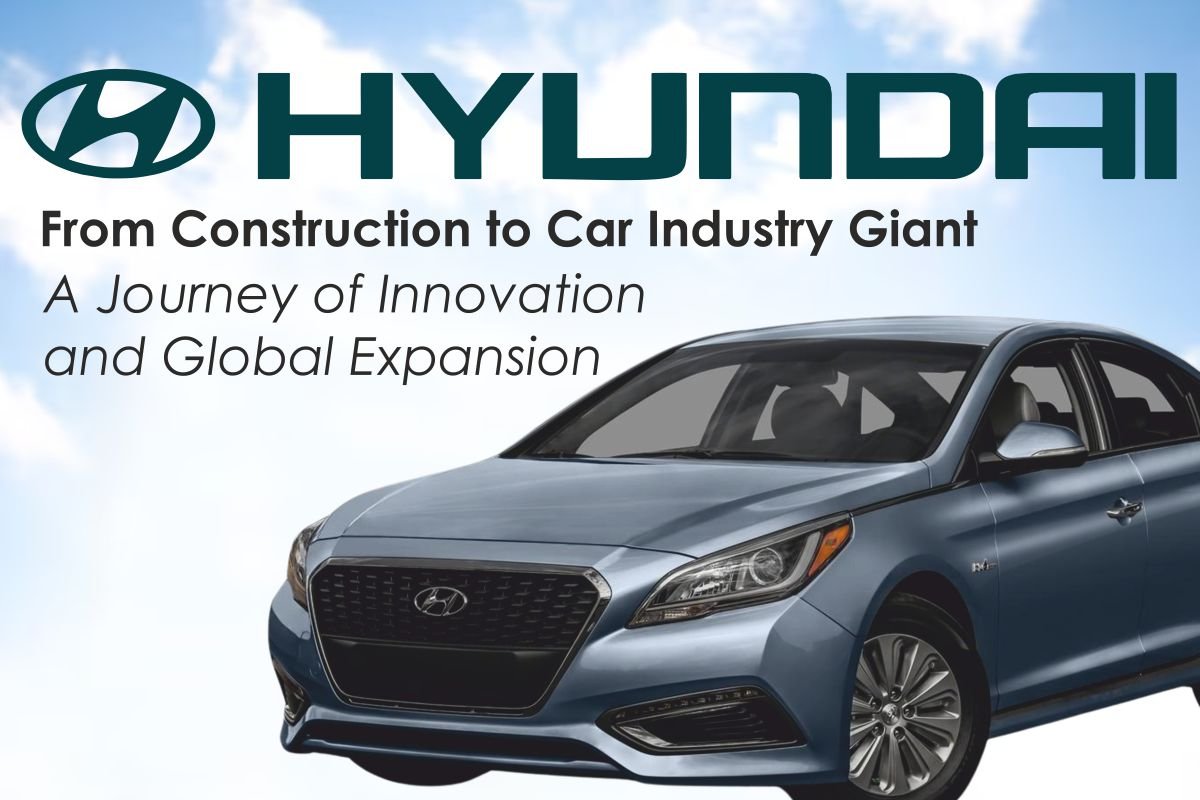Did you know Hyundai owns the world’s largest car manufacturing plant with its own shipping port, hospital and fire stations? Yes, its manufactuting plant of Ulsan, South Korea is not just a factory its like a mini city spans over 1,200 acres and can produce an impressive over 1.5 million vehicles annually. This impressive setup shows its commitment to efficiency and growth, marking its name on the top listed car brands globally.
In this article, you will explore its journey from humble beginning to becoming one of leading world’s car brands, known for its edge cutting technology, designs, and vision for the future of mobility.
Brand History

Hyundai’s history is a remarkable journey from a South Korean construction firm to a global automotive powerhouse. Founded in 1947 by Chung Ju-Yung as Engineering and Construction, the company initially focused on post-war rebuilding projects in South Korea. In 1967, this motor company was established, launching its first vehicle, the Pony, in 1975. Created with Italian design and Japanese engineering, the vehicle became South Korea’s first mass-produced car and marked the company entry into international markets.
In the 1980s, the company expanded to the U.S. with the affordable Excel, gaining popularity and driving its global growth. By the 1990s, the company invested in quality improvements and built the world’s largest automotive plant in Ulsan, South Korea. The introduction of a 10-year warranty in the 2000s helped the company further establish trust.
In 2015, the company launched its luxury brand, Genesis, and later entered the electric vehicle market with the Ioniq and Nexo, focusing on sustainability. Today, the company is a leader in innovation, with a commitment to carbon neutrality by 2045 and advanced technology in electric and hydrogen-powered vehicles. Company’s evolution reflects its dedication to quality, growth, and a sustainable future.
Business Model and Strategy

Hyundai’s business model focuses on innovation and growth through vertical integration, global expansion, and a strong commitment to sustainability. The company invests heavily in electric vehicles, hydrogen fuel cells, and cutting-edge technology to stay competitive while offering affordable, high-quality vehicles to a wide range of markets.
Global market expansion
Starting with the US market the company has gradually expanded into international markets of Europe, Asia, and South America. It customizes its car and marketing for different regions to strengthen its global presence.
Affordable, quality vehicles
The company focuses on manufacturing the vehicles that are reliable and high quality. To win the trust of customers and improve the brand’s reputation it has introduced the 10 year warranty period for its vehicles.
Technological innovation
This automobile company heavily invests in new technology, especially in the electric cars (EVs) and hydrogen fuel car vehicles. It is working to be a leader in manufacturing the eco-friendly transportation with models like Ioniq and Nexo.
Sustainability goals
The company has committed to achieve the carbon neutrality by 2045. It’s working on multiple projects to reduce emissions, use eco-friendly materials, and make more electric vehicles.
Digital transformations
It is embracing digital technology offering services like connected cars and app based tools to make driving more easier and more convenient.
Partnerships and acquisitions
It collaborates with the companies in technology, AI and EV sectors enhancing its technological capabilities. Partnerships with Uber and Aptiv for autonomous vehicles, aligns the company with cutting edge innovations in mobility solutions.
Global Strategy and Market Development
Hyundai’s global expansion strategy has been key to its success which allows it to establish its strong presence in markets worldwide. The company has its manufacturing plants in 190 countries which means it can cater to diverse customer needs across different regions. The instant solutions to customers problem has increased loyalty and trust for the company.
In addition to its success in traditional markets like North America and Europe, the company has expanded aggressively into emerging markets such as India, China, and Brazil. In these regions, it focuses on affordability, fuel efficiency, and durability to appeal to a growing middle class. The company’s models are designed to meet the specific demands of these markets, with a focus on small cars, compact SUVs, and affordable sedans.
Interesting Facts About Hyundai You Didn’t Know

Discover some lesser-known facts about the company, from its early days as a construction company to its groundbreaking innovations in the automotive industry. Uncover unique milestones and achievements that highlight its evolution and global impact.
- Before becoming the car manufacturing company it was working as a construction company building roads, bridges, and large scale infrastructure.
- The company is a major sponsor of football events, including partnering with international clubs and events like the FIFA World Cup.
- In 2019, the company’s luxury division, Genesis, partnered with European Space Agency to sent first car into the space to check how vehicles perform in the low gravity.
- Its vehicles are known for its bold and innovative designs for which it has been awarded multiple times
- iF Design Award
- Red Dot Design Award
- Good Design Award
- Automotive Brand Contest
- Automotive Design Excellence Award
- World Car Design of the Year
- The company’s high tech smart factory Ulsan works with the automated robots, artificial intelligence, and advanced manufacturing systems to ensure efficiency and precision in the production.
Conclusion
Starting as a construction company to becoming the world’s largest car manufacturing company, expanding its reach in 190 countries, generating $123.57 B annually, the story of Hyundai is a prime example of visionary leadership, innovation, and strategic growth. This journey serves as an inspiration for businesses to embrace change, invest in innovation, and expand their horizons to achieve long-term success.


















